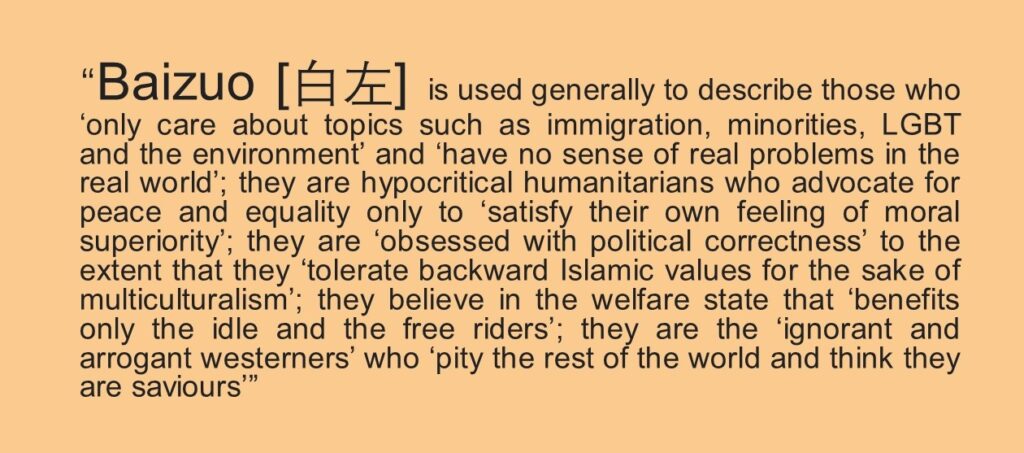A paper by Ge Chen

Hate speech has almost never been a major legal issue in China. It is not until very recently that the need to regulate online hate speech as a criminal offence attracted more attention from legal scholars. On the plane of governance, the problem of potential tensions between different nationalities, religions, genders and perhaps regions is a politically sensitive item, albeit far from being the most sensitive one that triggers the nerve of the ruling party. In most cases, such potential tensions are glossed over either by the work of the “United Front” or by media censorship. Due to the prevalence of the authoritarian, Confucianist, and Great-Han culture, those tensions are likewise often ignored by many ordinary Chinese: in their eyes, such issues range from being petty and unimportant to non-existent. After all, highlighting those issues marks profound deviation from a “harmonious” society in Confucianist illusion.
Yet those tensions do exist as in any other society. And speech expressive of hatred and resentment of anything in those categories is ubiquitous in China – online or offline. The reason why hate speech is neither a legally defined term nor anywhere properly regulated in Chinese law is that hate speech is simply ranked very low among various types of political speech in a highly authoritarian system of speech regulation. Where political speech lacks real constitutional protection, hate speech will not even be recognised as such. However, speech regulation is real and, by its very definition, hate speech does fall sometimes into the purview of such regulation. One of the main legal sources that captures hate speech regulation is China’s Criminal Code (Arts. 249 & 250). Other recent sources include numerous administrative regulations on publication as well as the new Civil Code (Art. 1183).
The reason why hate speech is neither a legally defined term nor anywhere properly regulated in Chinese law is that hate speech is simply ranked very low among various types of political speech in a highly authoritarian system of speech regulation.
Importantly, this emerging patchwork of hate speech regulation looms large amid a bunch of new online hate speech regulations in liberal democracies, where the constitutional protection of free speech is sacrosanct but may be circumscribed by equally important priorities. The constitutional and legal contours of speech protection and regulation, however, are at variance among those countries, and distinctly so between the US and Europe. At any rate, equality concerns are a rising factor that could puzzle even lawmakers and courts when it comes to a potential conflict between freedom and equality. So far the regulation of online hate speech has been a topic of controversy among politicians, lawyers, activists and media. While many are zealous followers of, say, minority protection and gender equality, others cast doubt on the overemphasis on equality-related considerations that could buttress authoritarians’ “benevolent violation” of personal freedom – here, in particular, freedom of expression.
Thus, it is highly interesting to look into the regulatory area of online hate speech through a comparative lens. Can those rising equalitarian considerations in the constitutional regulation of hate speech lend a hand to an authoritarian regime in legitimising its legal technique of restricting political speech in a more nuanced, less noticeable manner? At least, the notice and takedown regime is highly identical to that in western hate speech laws such as the German Network Enforcement Act (‘NetzDG’). But there are more advanced restrictive measures of political speech such as a manipulated campaign of unleashing hateful speech against liberalism itself. A leading example is the online, public disparagement of “White Left” (baizuo) which has had impingement on any liberal-minded speakers that may articulate their criticism of the mainstream ideologies or governance models.
This paper explores this unique pattern of regulating online hate speech in alignment with the prevailing regulatory framework in Europe and the US. The paper analyses the emerging regulatory patchwork of hate speech regulation in China which builds on the regulation of political speech in China and addresses the ways in which European and US approaches have informed Chinese law, though the latter are used in different ways within an authoritarian constitutional order characterised by demoralised pragmatism and interest-driven administrative law. The paper develops a case study of the disregulation of “white-left” commentators (deemed to represent Western liberalism), which raises questions about the connection between support for particular modes of regulation against the background of a particular political system, with differing roles for the state, private actors, and media organisations.
The paper “How equalitarian regulation of online hate speech turns authoritarian: a Chinese perspective” was published in the Journal of Media Law. Ge Chen is Assistant Professor in Global Media & Information Law at Durham Law School. His main research interest is free speech in international and comparative perspectives. He was postdoctoral research associate and remains associate of the Centre for Intellectual Property and Information Law at the University of Cambridge. He was resident fellow (Fulbright nominee) and remains affiliated fellow of the Information Society Project at Yale Law School. He was Visiting Academic of the Programme for Comparative Media Law and Policy at the University of Oxford. He is the author of Copyright and International Negotiations: An Engine of Free Expression in China? (CUP 2017), a research monograph featured in Harvard Law Review.
